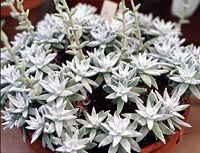
October 30, 2000
Arboretum helps protect rare island succulents
By Tim Stephens
 |
| Garden-grown plants of Munchkin Dudleya will be featured at the Arboretum's annual Dried Flower and Succulent Sale. |
By offering garden-grown plants of the rare succulent, known informally as the Munchkin Dudleya, to the public, the Arboretum hopes to discourage collectors from harming the few remaining wild plants. Protection of the plants in their natural habitat was set in motion several years ago by Arboretum botanist Stephen McCabe, who gave the plant its scientific name, Dudleya gnoma.
Dudleya gnoma was originally discovered on Santa Rosa Island in 1950 by Reid Moran of the San Diego Museum of Natural History. Moran found the plants growing in a 30- by 80-foot area on the island, then privately owned and operated as a cattle ranch, but he did not formally name the plant as a new species. The National Park Service bought the island in 1986 and it is now part of Channel Islands National Park. In 1993, McCabe joined park botanist Sarah Chaney to look for the plants Moran had discovered.
McCabe and Chaney found the original population of Munchkin Dudleyas, as well as two nearby subpopulations. But they were dismayed to find that cattle had uprooted large numbers of them. About 10 percent of the 3,400 plants in the total population had been uprooted. Further exploration did not uncover any additional populations.
McCabe then began the lengthy process, including careful research, needed to assign the plant a scientific name so that it could be recognized as a unique species and granted legal protection. The U.S. Fish and Wildlife Service, hearing of McCabe's intentions to publish a formal description of the species, started the process of listing it as an endangered species. And researchers with the National Biological Survey began studying the population size and reproductive success of the Munchkin Dudleyas.
As the evidence mounted that the plants were in need of protection, the National Park Service decided to fence off the populations to keep cattle from trampling them. Eventually, the Park Service removed all of the cattle from Santa Rosa Island to protect other endangered species on the island in addition to the Munchkin Dudleyas. After the threat from cattle had been removed, the Fish and Wildlife Service decided not to list McCabe's new species as endangered after all.
Currently, the main threat to the Munchkin Dudleya is from potential collecting by hobbyists. The best way to head off this threat is to make garden-grown plants more widely available, McCabe said.
The Munchkin Dudleya has been available periodically at specialists' shows since
Moran collected it in 1950, but it has not been easy to find. The UCSC Arboretum
is now selling garden-grown cuttings from the original 1950 collections at its annual
Dried Flower and Succulent Sale.
The sale will take place at the Arboretum on November 4 and 5, from 10 a.m. to 4
p.m. both days. The Arboretum is located on Empire Grade one-half mile from the main
entrance to campus at Bay and High Streets.
The UCSC Arboretum is open daily from 9 a.m. to 5 p.m. The Arboretum gift shop, Norrie's
Gifts, is open Tuesdays through Saturdays, 10 a.m. to 4 p.m., and Sundays, 1 p.m.
to 4 p.m. The Jean and Bill Lane Horticultural Library is open Wednesdays through
Sundays, 1 p.m. to 4 p.m.
Return to Front Page
![]()